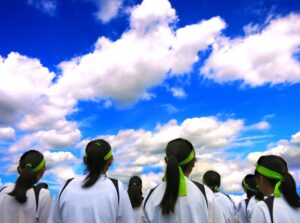JAPAN IN
ONE MINUTE 
~Why Japanese Students Train So Hard: Discipline, Teamwork, and Competition~
Then, do “Bukatsu” take place every weekend?
No, it depends on “Bukatsu“.
In Japan, “Bukatsu” is a very big part of school life. Students usually practice after school, and sometimes even on weekends.
For many sports clubs, it’s normal to practice six days a week!
Even cultural clubs like art or music meet almost every day.
Because of this, balancing schoolwork and club activities can be really tough.
Six days a week?
That’s so intense! I can’t imagine having practice almost every day.
No free time left for playing video games!
Another important feature is the relationship between seniors and juniors.
Juniors always show respect to seniors, while seniors guide and mentor juniors.
Through this system, students learn about courtesy, teamwork, and how to get along with others.
This is very important, because in Japan, when you work at a company,
you also need to be polite to older colleagues and use honorific language. So in a way, this period serves as practice for that.
That’s interesting. It sounds strict, but also like a good way to prepare for society,
since respect and cooperation are so important in Japan.
So… juniors bow, and seniors behave like bosses?
Yes. Also, clubs take part in many competitions.
Sports clubs train hard to compete at regional and national levels, while cultural clubs join contests or give performances.
For many students, these competitions are the highlight of their school life.
I see! So, it’s not just practice, there’s also a big goal to aim for.
That must be exciting and maybe a little stressful too.
I see! That’s exactly what Bunbu ryōdō is all about!
Summary
Through strict training in “Bukatsu“, senior and junior relationships, and competitions, students not only develop skills but also learn discipline, respect, and teamwork.




